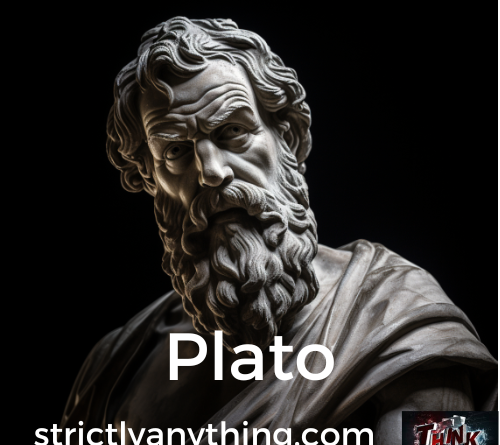Plato
Plato, one of the most influential philosophers in history, was born in Athens, Greece, around 428 or 427 BCE. Coming from a wealthy and notable family, his father Ariston traced his lineage back to the legendary Solon, an Athenian statesman renowned for his wise legislation. Plato’s mother Perictione was also a member of an esteemed family.
From the very beginning, it seemed that Plato was destined for greatness. During his early years, Plato received a comprehensive education in various subjects like mathematics, music, and gymnastics.
His instructor in rhetoric was Dionysius of Syracuse while studying philosophy under Cratylus and Heraclitus. Despite excelling in these areas, it wasn’t until he met Socrates that Plato’s true passion for philosophy ignited.
Plato became deeply fascinated by Socrates’ unique teaching methods and philosophical inquiries. He admired how Socrates challenged societal norms and encouraged critical thinking among his disciples.
Inspired by this mentorship, Plato decided to become a student of Socrates himself. Under the tutelage of Socrates, Plato developed a profound appreciation for dialectics—engaging in conversations to explore conflicting ideas and arrive at deeper truths.
He witnessed firsthand how Socrates fearlessly questioned individuals about their beliefs and forced them to confront inconsistencies within their own arguments. The bond between Plato and Socrates grew strong over time as they engaged in intellectual discussions both within the confines of Athens’ city walls and during their travels outside the city limits.
However, their association took an unfortunate turn when Athens sentenced Socrates to death on charges of impiety and corrupting the youth—an event chronicled by Plato himself in “The Apology.” laid a strong foundation for his future philosophical pursuits.
The combination of his privileged upbringing with exposure to extraordinary thinkers like Socrates shaped him into the brilliant philosopher he would later become. The encounters he had during this formative period profoundly influenced his philosophical inquiries and laid the groundwork for his future works, which would go on to shape the course of Western philosophy forever.
Apprenticeship with Socrates
Plato’s apprenticeship with Socrates was a defining period in his life, shaping his philosophical views and influencing his future works. Plato first encountered Socrates when he was a young man, and he quickly became captivated by the older philosopher’s wisdom and unique teaching methods. Their relationship blossomed into a deep friendship, with Plato becoming one of Socrates’ most devoted followers.
During his apprenticeship, Plato witnessed firsthand the Socratic method in action. Socrates had a remarkable ability to engage people in thought-provoking conversations that challenged their beliefs and forced them to question their own knowledge.
This method involved asking probing questions to uncover contradictions or gaps in logic, ultimately guiding individuals towards discovering truth for themselves. Plato was fascinated by this approach and recognized its power in seeking philosophical understanding.
One of the most notable events during Plato’s apprenticeship with Socrates was the famous trial of his mentor. In 399 BCE, Socrates was accused of impiety and corrupting the youth of Athens.
The trial resulted in Socrates being sentenced to death by drinking hemlock. This profound event deeply impacted Plato, leading him to explore themes of justice, morality, and the nature of knowledge throughout his later works.
After witnessing the unjust execution of his beloved mentor, Plato decided to dedicate himself fully to philosophy. He founded the Academy in Athens, an institution that would become renowned for its intellectual pursuits for centuries to come.
The Academy served as a gathering place for scholars interested in exploring philosophy through rigorous debate and inquiry. Plato’s experiences during his apprenticeship with Socrates played a pivotal role not only in shaping his own philosophical ideas but also in preserving the teachings and legacy of Socrates after his death through dialogues like “The Apology.” Through these dialogues, Plato sought not only to honor his mentor but also to continue engaging readers in critical thinking about important questions regarding virtue, justice, and human nature.
Plato’s apprenticeship with Socrates profoundly influenced his philosophical journey. The close bond he developed with Socrates and the impact of witnessing his mentor’s trial and execution left an indelible mark on Plato’s thinking.
Throughout his life, Plato would draw upon these experiences, using them as a foundation to explore fundamental questions about reality, morality, and the pursuit of knowledge. The legacy of their relationship lives on through Plato’s extensive body of work that continues to inspire and challenge thinkers to this day.
Greatest Works
Plato is widely regarded as one of the most influential philosophers in history, and his greatest works continue to shape our understanding of ethics, politics, and metaphysics. In this section, we will delve into some of Plato’s most significant works that have stood the test of time.
One of Plato’s most famous dialogues is “The Republic.” In this monumental work, Plato presents his vision of an ideal society governed by philosopher-kings. Through thought-provoking discussions between Socrates and various characters, Plato explores concepts such as justice, the nature of the soul, and the role of education in shaping the perfect society.
“The Republic” serves as a powerful critique of democracy while advocating for a system that prioritizes wisdom and virtue. Another notable work by Plato is “Phaedrus.” This dialogue explores the nature and power of rhetoric through a conversation between Socrates and Phaedrus.
Plato delves into the art of persuasion while examining its potential to manipulate or enlighten individuals. He emphasizes the importance of using rhetoric responsibly and ethically to pursue truth rather than mere persuasion.
Plato’s dialogue titled “Symposium” offers profound insights into love and desire. The Symposium takes place at a gathering where intellectuals discuss love in its various forms.
Through different speeches delivered by characters like Phaedrus, Pausanias, and Alcibiades, Plato provides nuanced perspectives on eros – from physical desire to intellectual attraction – ultimately asserting that true love leads us towards philosophical contemplation. We cannot overlook “Phaedo,” which chronicles Socrates’ final hours before his execution.
This dialogue captures Socrates’ unwavering commitment to reason and philosophy even in the face of death. Socrates discusses topics such as immortality of the soul, reincarnation, and his belief in an afterlife.
“Phaedo” showcases both Plato’s admiration for his mentor Socrates as well as his own philosophical ideas regarding the nature of existence and the pursuit of truth. Plato’s greatest works not only exemplify his intellectual prowess but also demonstrate his dedication to exploring profound questions about human nature, society, and the pursuit of knowledge.
Through engaging dialogues like “The Republic,” “Phaedrus,” “Symposium,” and “Phaedo,” Plato invites readers to embark on an intellectual journey that challenges conventional wisdom and encourages critical thinking. These works continue to inspire scholars, philosophers, and individuals seeking a deeper understanding of the human experience.
Quotes
“Courage is knowing what not to fear.”
“Wise men speak because they have something to say; fools because they have to say something.”
“At the touch of love, everyone becomes a poet.”
“We can easily forgive a child who is afraid of the dark; the real tragedy of life is when men are afraid of the light.”
“The measure of a man is what he does with power.”
“He who commits injustice is ever made more wretched than he who suffers it.”
“Ideas are the source of all things.”
“Ignorance, the root and stem of all evil.”
“The heaviest penalty for declining to rule is to be ruled by someone inferior to yourself.”
“We do not learn; and what we call learning is only a process of recollection.”
Conclusion
Plato’s contributions to philosophy and his enduring impact on Western thought cannot be overstated. Through his close association with Socrates and his own intellectual brilliance, Plato crafted a body of work that continues to shape our understanding of ethics, metaphysics, politics, and epistemology. One of Plato’s greatest achievements was his attempt to preserve the teachings of his mentor Socrates through his dialogues.
These dialogues not only serve as a tribute to Socrates but also as a medium for Plato’s own philosophical exploration. By presenting Socrates as the central character in many of these dialogues, such as “The Apology of Socrates,” Plato immortalizes both Socrates’ wisdom and his tragic fate.
Plato’s dialogues offer readers profound insights into various philosophical questions. Whether it is exploring the nature of justice in “The Republic” or discussing forms and ideas in “Phaedrus,” Plato demonstrates an unparalleled ability to provoke thought and challenge conventional wisdom.
His pursuit of knowledge through critical thinking and dialectic remains an inspiration for philosophers today. Furthermore, Plato’s impact extends beyond just philosophy.
His influence can be seen in fields such as mathematics, science, literature, and even politics. Many famous philosophers like Aristotle were deeply influenced by Plato’s ideas and built upon them in their own works.
In essence, Plato leaves behind a rich intellectual legacy that continues to inspire generations. His dedication to truth-seeking, rational inquiry, and the pursuit of justice serves as a guiding light for those who seek wisdom and understanding in the world.
As we delve into the works of this remarkable ancient thinker, we are reminded that timeless concepts like truth, virtue, beauty – all intricately woven within the writings of Plato – transcend time periods and cultural differences. Ultimately, studying Plato is not just an academic exercise; it is an invitation to embrace curiosity and embark on a journey towards self-improvement.
While grappling with complex philosophical concepts may at times be challenging, it is through this intellectual engagement that we can broaden our horizons, deepen our understanding of the world, and cultivate a more enlightened worldview. So let us join hands with Plato and continue the pursuit of knowledge and wisdom, for it is in this ongoing quest that we find true fulfillment and meaning in our lives.

